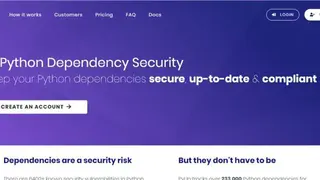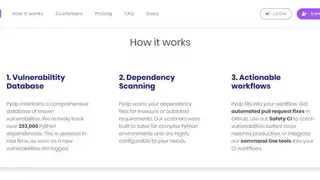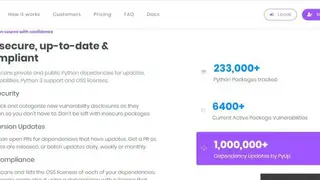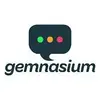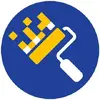
Pyup.io
Pyup.io is a solution that enables users to keep their Python Dependencies secure, compliant, and up-to-date. The platform helps users to protect their more than six thousand security vulnerabilities, which can result in the breach of data.
The working of this solution is simple; i.e., it maintains a vulnerability database of more than two hundred thousand dependencies. Whenever a new dependency logs in, the platform tracks it in real-time and makes it a part of its database. Moreover, it also scans the dependency files of users to make sure there are no outdated or insecure files.
Users can attach it to their workflow system and can use its Safety system to catch vulnerabilities before code reaches production. Pyup.io also scans both the private and public dependencies, and it scans the OSS licenses of each of user’s dependencies. Lastly, it is an open-source solution and comes with a 7-day free trial.
Pyup.io Alternatives
#1 Gemnasium
Gemnasium was a platform that used to keep an eye on the project dependencies and alerts users about any threat or available updates. The platform had a simple interface, and it allowed users to view all of their projects and servers over a single dashboard in the form of a list. The software is known as the administrative framework for Ruby and Rails applications.
Gemnasium allowed users to know about the status of their package related to dependencies, and users can get reports on all these dependencies. The platform enables users to secure their applications and helps them to stay away from the headlines, which tells about the compromise of an application.
Through the help of the drag-and-drop feature, users can add any number of dependencies to the platform, and they can update about the security vulnerabilities which are affecting their code. Lastly, it is paid software and works on all Java, npm, PyPI, and Packagist dependencies.
#2 Snyk
Snyk is an online platform that enables developers to develop fast, stay secure, and helps in finding and fixing vulnerabilities in open-source libraries. The platform offers powerful fix advice to developers and enables them to scale their work at high speed. It also enables developers to own security by integrating into their existing workflows.
Snyk also allows users to move quickly and helps in fixing vulnerabilities faster than the industry average. The platform also comes with an open-source product that allows users to accelerate fixing vulnerabilities throughout the development process. Moreover, it allows users to test their projects directly from the repository and helps developers on finding new vulnerabilities.
The solution also allows users to analyze easily and makes data-driven security decisions. Moreover, it allows users to prioritize their fixes on the analysis of vulnerabilities and offers high accuracy alerts to users. Lastly, users get notifications whenever new vulnerabilities appear.
#3 Libraries.io
Libraries.io is an online database and discovery service that offers open-source packages, modules, and frameworks that developers can use in their codes. Users have to type the name of the package or framework which they want. The solution also comes with different package managers such as Go, npm, PyPI, CocoaPods, WordPress, CPAN, etc.
Similarly, it also has various open-source licenses such as MIT, Apache-2.0, ISC, WTFPL, Unlicense, EPL-1.0, etc. Users can only add libraries to their system if they exist on any of the package managers. Moreover, users can view trending packages on the Libraries.io with their details described with them. Lastly, users can also log in to the platform by using their GitHub, GitLab, and BitBucket identities.
#4 WhiteSource Renovate
WhiteSource Renovate is a platform that allows users to save their time by automating their dependency updates in software projects. It is a customizable solution that comes with settings that adjust itself to suit any kind of workflow. The solution comes with four different kinds of products, i.e., Open Source Project, which users can install and run the CLI tool for dependency updates.
The other product is a GitHub and GitLab App that users can install in their GitHub repos for dependency checking. Moreover, users can also use its on-premise solution to search dependencies in the user’s software automatically.
The solution runs in real-time and detects all the latest available updates and provides them to users. Moreover, it comes in multiple languages and supports all file types to detect dependencies wherever users want. Lastly, all the histories and changelogs are added with every new update, and users can run tests in their updates.
#5 David
David is a platform that enables users to get an overview of their project dependencies. The platform allows users to view the version of the software they are using and the latest version of the software that is available in the market. Users get a badge that contains all the details about the updates of the software, and users can place the link on their website.
Users can declare their dependencies in a package.json file, and it is free for all kinds of public projects. After placing the dependencies on the JSON file, all the work is done by the platform as users get their own status page where all of their dependencies are listed. Lastly, the platform presents all dependencies, which are all the files in the form of a dependency cloud.
#6 Requires.io
Requires.io is a platform that helps users to stay secure and up-to-date when it comes to their dependencies. It allows users to keep their python projects secure and allows them to monitor their dependencies automatically instead of manual tracking. Users just have to click the search icon, and all the changelogs are displayed.
Users just have to link their accounts to this platform and activate their projects in it, and the platform starts looking for the dependencies. Moreover, uses can set up notifications such as badges or emails to let them know if any problem occurs. It also offers simple snippets of code that helps users to alter the behavior of this solution.
Requires.io also enables users to check the results of manual monitoring through the dashboard where everything is visible. Moreover, Requires.io also allows users to filter out a single package during its release with a known bug.
#7 Depfu
Depfu is a platform that helps users to regain control of their dependencies while keeping their apps up-to-date. The platform even notifies users whenever a new version is available for the update. Moreover, the platform goes with the pace of users’ applications and never exerts pressure on the Safety CI system with any update.
The platform offers users everything and all kind of information to help them in making informed decisions about any dependence update. Moreover, the platform scans the system and apps of the users and only sends such updates that users need to keep their systems running.
Depfu enables users to stay notified whenever there is a new security update available and helps in deploying them quickly. Moreover, if users have any security vulnerabilities in their dependencies, the platform sends PRs for that first. Lastly, its dashboard allows users to view the whole status of dependencies and what Depfu is doing.
#8 Vigiles
Vigiles is an intelligent vulnerability management suite that best supports the Embedded Linux device with its advanced security. It provides a better data table with Vigiles because it allows four times more accurate data having the NVD database. You have rich insights with more time, and you do not check vulnerabilities and false positives all the time. There are vulnerabilities reported filters, which means you will focus on those that affect the SBOM.
Say goodbye to the old manual ways because more automation will reduce up to 90 percent end-to-end security maintenance tasks. Cybersecurity issues are continuously evolving in the current world, but Vigiles is tackling all the concerns with tools and security solutions. You are selecting Vigiles as your security partner. The answer is simple: your first SCA solution is optimized for embedded systems with native integration support and generating automated remediation information for effective patch monitoring.
